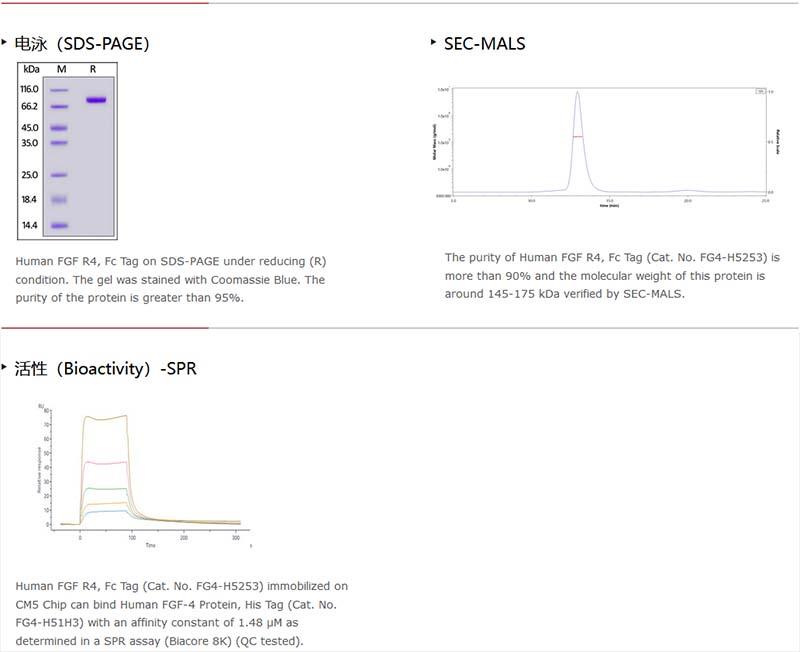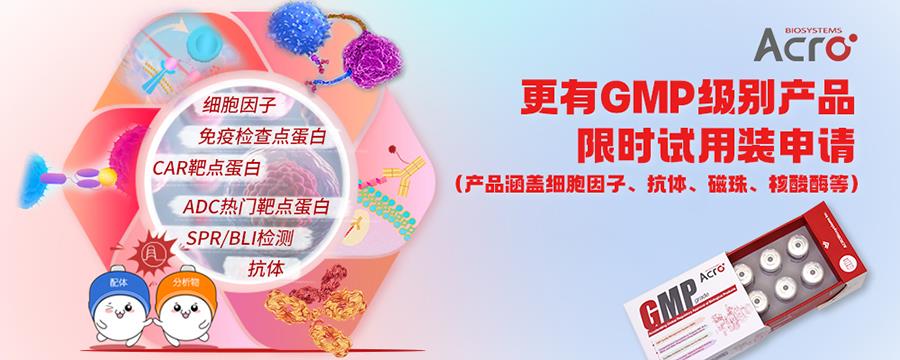FGFR4產(chǎn)品信息
英文名稱:Fibroblast growth factor receptor 4
中文名稱:成纖維細胞生長因子受體-4
靶點別稱:FGFR4,CD334,JTK2,MGC20292,TKF
物種:Human/Mouse
屬性:Protein
標記:Unconjugated
內(nèi)毒素(Endotoxin)
Less than 1.0 EU per μg by the LAL method.
純度(Purity)
>95% as determined by SDS-PAGE.
>90% as determined by SEC-MALS.
制劑(Formulation)
Lyophilized from 0.22 μm filtered solution in 50 mM Tris, 100 mM Glycine, 25 mM Arginine, 150 mM NaCl, pH7.5 with trehalose as protectant.
Contact us for customized product form or formulation.
重構(gòu)方法(Reconstitution)
Please see Certificate of Analysis for specific instructions.
For best performance, we strongly recommend you to follow the reconstitution protocol provided in the CoA.
存儲(Storage)
For long term storage, the product should be stored at lyophilized state at -20°C or lower.
Please avoid repeated freeze-thaw cycles.
This product is stable after storage at:
-20°C to -70°C for 12 months in lyophilized state;
-70°C for 3 months under sterile conditions after reconstitution.

FGFR4分子背景
Fibroblast growth factor receptor 4(FGFR4) is also known as CD334, JTK2, hydroxyaryl-protein kinase, TKF, protein-tyrosine kinase . The FGFR4 gene provides instructions for making a protein called fibroblast growth factor receptor 4. This protein is part of a family of fibroblast growth factor receptors that share similar structures and functions. These receptor proteins play a role in important processes such as cell division, regulating cell growth and maturation, formation of blood vessels, wound healing, and embryo development.The FGFR4 protein interacts with specific growth factors to conduct signals from the environment outside the cell to the nucleus. The nucleus responds to these signals by switching on or off appropriate genes that help the cell adjust to changes in the environment. In response, the cell might divide, move, or mature to take on specialized functions. Although specific functions of FGFR4 remain unclear, studies indicate that the gene is involved in muscle development and the maturation of bone cells in the skull. The FGFR4 gene may also play a role in the development and maintenance of specialized cells (called foveal cones) in the light-sensitive layer (the retina) at the back of the eye.

關(guān)鍵字: FGFR4;FGFR4蛋白;CD334蛋白;ACRO;百普賽斯;
百普賽斯集團ACROBiosystems Group(股票代碼:301080)是成立于2010年的跨國生物科技公司����,是為全球生物醫(yī)藥����、健康產(chǎn)業(yè)領(lǐng)域提供關(guān)鍵生物試劑產(chǎn)品及解決方案的行業(yè)平臺型基石企業(yè)。2021年在創(chuàng)業(yè)板上市����。百普賽斯集團業(yè)務(wù)遍布全球,橫跨亞洲��、北美洲、歐洲����,在中國、美國�����、瑞士等12個城市設(shè)有辦公室����、研發(fā)中心及生產(chǎn)基地。目前累計服務(wù)客戶超6000家����,與全球Top 20醫(yī)藥企業(yè)均建立了長期、穩(wěn)定的合作伙伴關(guān)系����。集團旗下?lián)碛衅放艫CROBiosystems百普賽斯、bioSeedin柏思薈���、Condense Capital墾拓資本和ACRODiagnostics百斯醫(yī)學(xué)等。